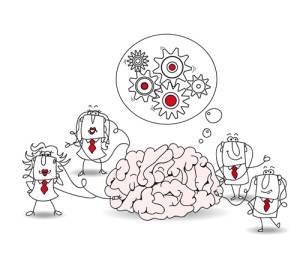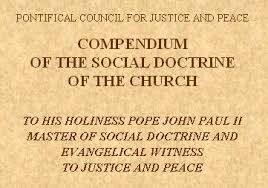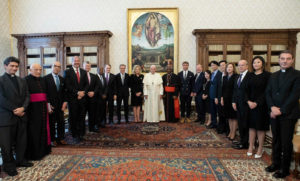Part 1: Why do we need to transform our consciences to practice Catholic economics? Then, how do we transform structures in society?
 Transforming our consciences can be a very difficult task to accomplish. Actually, our consciences are transforming everyday from the experiences we go through and the situations that force us to make decisions. When it comes to transforming our consciences in relation to practicing Catholic economics, we must change our views from secular to being about the person.
Transforming our consciences can be a very difficult task to accomplish. Actually, our consciences are transforming everyday from the experiences we go through and the situations that force us to make decisions. When it comes to transforming our consciences in relation to practicing Catholic economics, we must change our views from secular to being about the person.
What I mean by this is that our conscience must be formed in a way that focuses on the dignity of the person and not just making profits. We can try to change our conscience by viewing work as a way to help others and yourself instead of just making the pay check. This leads to our society changing the structures (norms) that are a part of economics.
Businesses should change the purpose of their company and to focus on helping the persons working for them instead of “using” them like an expendable tool. Our world is run by the almighty dollar and big time corporations treat the dollar better than they treat their own employees. Altering the way we look at work and how we treat others will have a huge effect on the other “norms” in society.
An example of this could be that the education system changes it’s ways from pumping out classes of students who all have “individualistic” ideals and motives to young people who care for others and do what they can to help society function in a morally sound fashion. Now this won’t happen in a day, but if we invest in changing the normal, selfish conscience of most people today, then our world could make a huge turnaround for the better.
Part 2: In Class Essay on why Catholic Social Teaching creates an alternative to communism as well as capitalism’s emphasis on materialism.
 Catholic Social Teaching is something that is important to help lead your life by. Many of the political beliefs today, like communism / Marxism / collectivism, all incorporate the government in our lives a little too much. They all emphasize materialism. Materialism is one of the biggest issues in today’s society because the person wants more and more all the time.
Catholic Social Teaching is something that is important to help lead your life by. Many of the political beliefs today, like communism / Marxism / collectivism, all incorporate the government in our lives a little too much. They all emphasize materialism. Materialism is one of the biggest issues in today’s society because the person wants more and more all the time.
That is a big flaw in the eyes of Catholic Social Teaching. I am going to explain why Catholic Social Teaching is an alternative to these other economic-political beliefs. First, let’s dive into communism.
Communism is a social, political, and economic ideology and movement whose ultimate goal is a socioeconomic order structured upon the common ownership of the means of production and the absence of social classes, money, and the state.
 From history, we can all agree that communism doesn’t uphold the dignity of the human person due to the shear fact of how the people are treated by it’s government.
From history, we can all agree that communism doesn’t uphold the dignity of the human person due to the shear fact of how the people are treated by it’s government.
Saint Pope John Paul II said in his Centesismus Annus, “A society is alienated if its forms of social organization, production and consumption make it more difficult to offer this gift of self and to establish this solidarity between people.” With this being true, a communist society eliminates the possibility of the person to express solidarity among the community.
It would make it harder for a person to give themselves to another without asking anything in return (love’s definition according to Brother Peter). The communist society would focus on “distributing equally” the goods among its people in such a strict manner, along with selling people’s labor to create a profit. It is all about making / controlling profit in the communist eyes, no matter what that means.
The total control of property and opposition of any other belief points back to materialism, which is what the central government is run on in communism.
Catholic Social Teaching takes another way instead of these irrational communist beliefs because it is all about the person. Pope John Paul II says, “A person who is concerned solely or primarily with possessing and enjoying, who is no longer able to control his instincts and passions, or to subordinate them by obedience to the truth, cannot be free.” Being free lets the person figure out who they are by figuring out who God is. A relationship with God is the ultimate goal (along with going to Heaven) and being who God made us to be will only lead us to Him in the end.
Next, let us understand why Catholic Social Teaching takes another path compared to Marxism. I am not a big fan of this belief whatsoever due to the fact that the person is considered as an “aspect of production” (classroom.synonym.com). It makes human life less meaningful and turn someone into a piece of society, a cog basically, that is used to produce materials. Karl Marx’s beliefs were based upon dialectical materialism, which is a “theory that explains as the result of material forces in conflict and contradiction” (classroom.synonym.com).
The fundamental beliefs of Marxism are rooted in materialism since that is what Marx thought people instead were social beings who reflected what they did in their community or society. Catholic Social Teaching differs from this because the person is treated as an individual who is his own person.
Pope Benedict XVI said in his Caritas in Veritate that, “Economic activity…. needs to be directed towards the pursuit of the common good, for which the political community in particular must also take responsibility.” The common good is not achieved in the Marxist views because it focuses on what the society does as whole, not what is good for the society as a whole. Focusing on the common good is a main aspect our government should aspire to achieve because it will in turn help the human person become more spiritually in-tact and spread solidarity to others.
Even though there are flaws in capitalism, I think Catholic Social Teaching is more relatable to it because its views are similar in that it is based on the principle of individual rights which support the dignity of the human person. Seeing as we live in a capitalist country, it is harder to point out the bad aspects of capitalism (even though our current President’s ideologies are a complete contradiction to what this country was built on). If capitalism focused a little more on the common good of the society as a whole and incorporated subsidiarity and solidarity, the economy might work more efficiently in terms of the person.
— S., Machebeuf Student
[hr_shadow]
[h5]This blog post is a contribution from a member of the senior class at Bishop Machebeuf High School in Denver, Colorado. The seniors take an in-depth course in Catholic Social Teaching during their fall semester, with the Compendium of the Social Doctrine of the Church as their key text, supplemented by the more recent writings of Pope Emeritus Benedict XVI and Pope Francis. Catholic Social Teaching is meant to be shared, so the students write, not simply to demonstrate their understanding, but also to communicate the truth of Christ to the wider Denver and digital community through Attollo. We hope you enjoy and are challenged by the writing of these amazing seniors! [/h5]
[hr_shadow]



